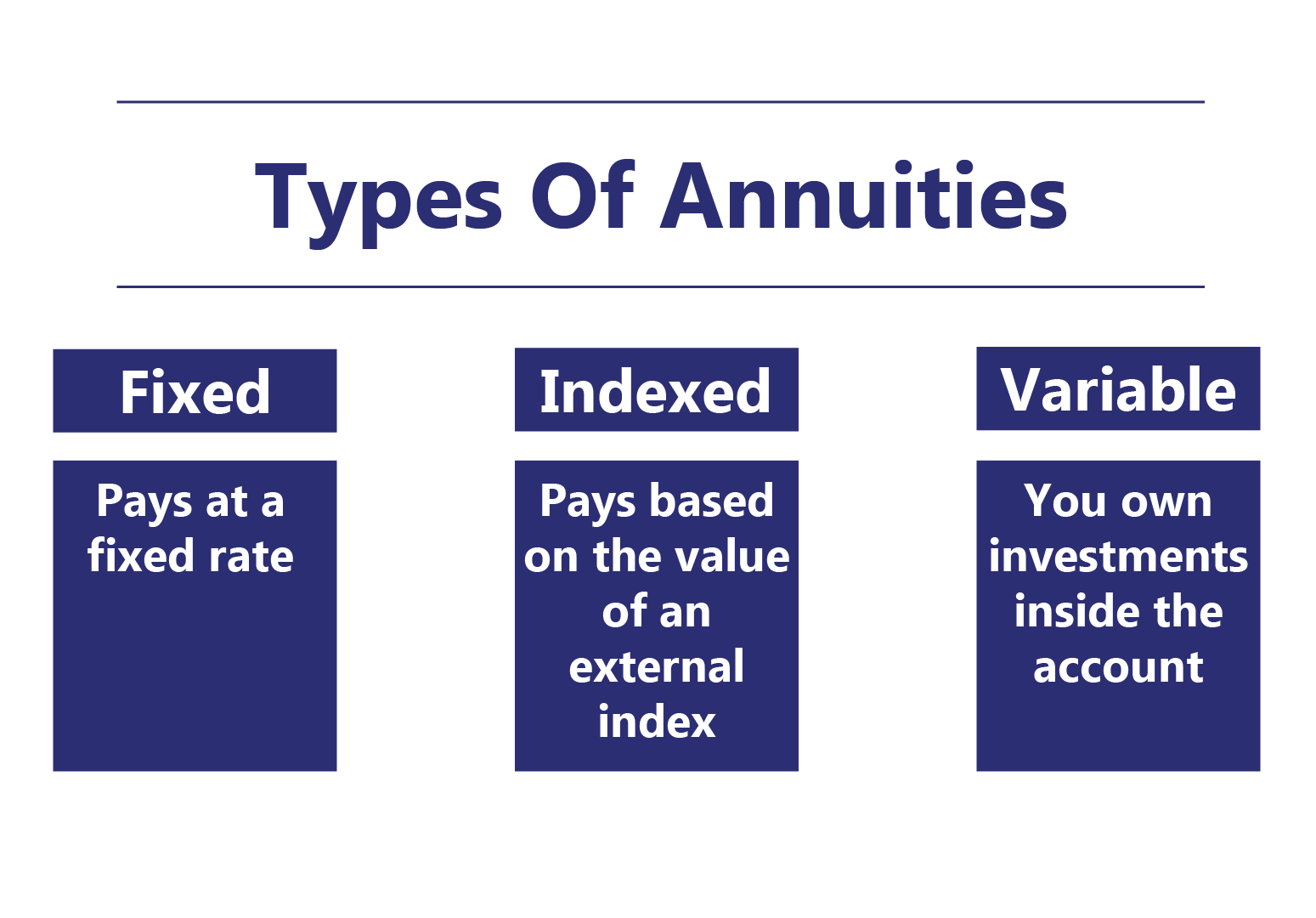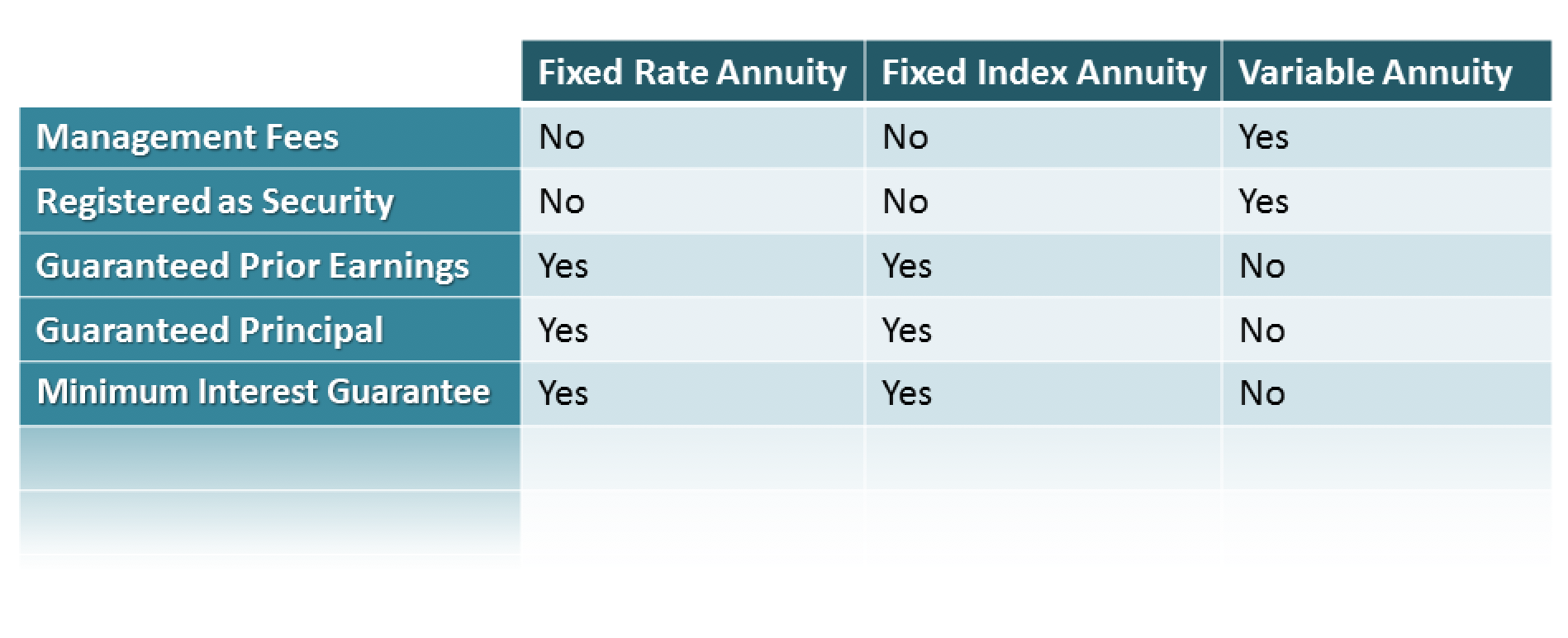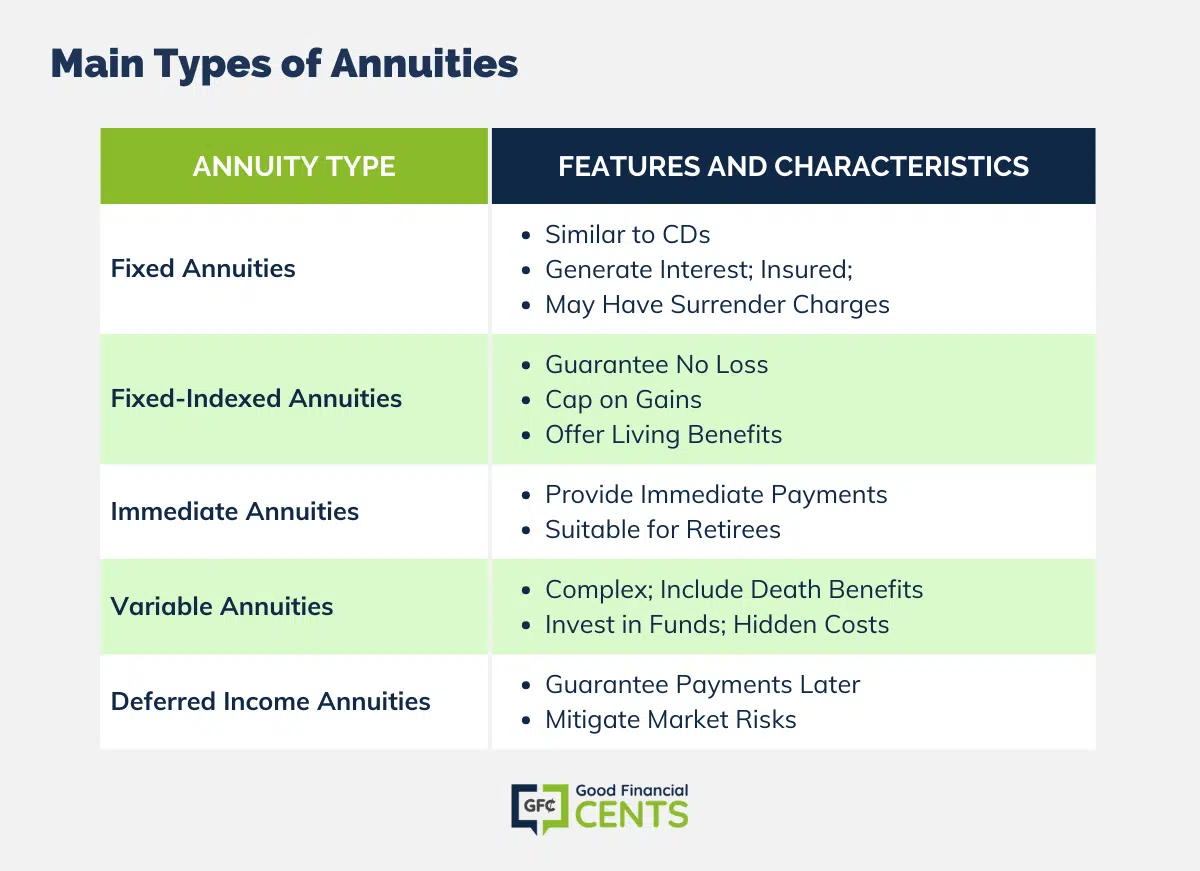All Categories
Featured
Table of Contents
With a variable annuity, the insurance provider purchases a portfolio of shared funds picked by the customer. The efficiency of those funds will figure out how the account grows and just how big a payment the purchaser will at some point get. Individuals that choose variable annuities agree to take on some degree of danger in the hope of creating larger revenues.
If an annuity customer is wed, they can pick an annuity that will certainly continue to pay revenue to their spouse need to they die. Annuities' payments can be either prompt or deferred. The standard inquiry you need to consider is whether you want normal earnings currently or at some future date.
A credit permits the cash in the account more time to grow. And similar to a 401(k) or an individual retirement account (INDIVIDUAL RETIREMENT ACCOUNT), the annuity proceeds to collect incomes tax-free up until the money is taken out. With time, that could construct up right into a considerable amount and lead to larger repayments.
With an immediate annuity, the payments start as quickly as the buyer makes a lump-sum repayment to the insurance firm. There are a few other vital decisions to make in acquiring an annuity, relying on your scenarios. These consist of the following: Purchasers can schedule payments for 10 or 15 years, or for the remainder of their life.
Analyzing Variable Annuity Vs Fixed Annuity A Closer Look at How Retirement Planning Works What Is Annuities Variable Vs Fixed? Features of Smart Investment Choices Why Choosing the Right Financial Strategy Can Impact Your Future How to Compare Different Investment Plans: How It Works Key Differences Between Different Financial Strategies Understanding the Risks of Long-Term Investments Who Should Consider Strategic Financial Planning? Tips for Choosing the Best Investment Strategy FAQs About Planning Your Financial Future Common Mistakes to Avoid When Planning Your Retirement Financial Planning Simplified: Understanding Your Options A Beginner’s Guide to Smart Investment Decisions A Closer Look at How to Build a Retirement Plan
That may make good sense, for instance, if you need a revenue boost while settling the final years of your home mortgage. If you're wed, you can choose an annuity that pays for the remainder of your life or for the rest of your partner's life, whichever is much longer. The last is typically described as a joint and survivor annuity.
The option between deferred and prompt annuity payments depends largely on one's financial savings and future incomes goals. Immediate payouts can be useful if you are already retired and you require an income to cover day-to-day costs. Immediate payouts can start as quickly as one month right into the acquisition of an annuity.
Individuals normally get annuities to have a retirement earnings or to develop cost savings for another purpose. You can get an annuity from a qualified life insurance coverage representative, insurance provider, economic coordinator, or broker. You must speak to a monetary consultant concerning your demands and objectives prior to you buy an annuity.
The difference between the 2 is when annuity settlements begin. You don't have to pay tax obligations on your revenues, or contributions if your annuity is a private retired life account (INDIVIDUAL RETIREMENT ACCOUNT), up until you take out the earnings.

Deferred and instant annuities use a number of choices you can select from. The options provide various levels of possible risk and return: are ensured to earn a minimum interest rate.
enable you to choose in between sub accounts that resemble mutual funds. You can earn more, yet there isn't an ensured return. Variable annuities are higher risk since there's a chance you could shed some or every one of your money. Fixed annuities aren't as high-risk as variable annuities due to the fact that the financial investment threat is with the insurer, not you.
Breaking Down Your Investment Choices A Comprehensive Guide to Investment Choices Breaking Down the Basics of Annuities Variable Vs Fixed Features of Variable Annuity Vs Fixed Annuity Why Variable Vs Fixed Annuities Can Impact Your Future How to Compare Different Investment Plans: How It Works Key Differences Between Different Financial Strategies Understanding the Key Features of Long-Term Investments Who Should Consider Strategic Financial Planning? Tips for Choosing Fixed Annuity Vs Variable Annuity FAQs About Planning Your Financial Future Common Mistakes to Avoid When Choosing Fixed Vs Variable Annuity Financial Planning Simplified: Understanding Fixed Annuity Vs Equity-linked Variable Annuity A Beginner’s Guide to Smart Investment Decisions A Closer Look at How to Build a Retirement Plan
If performance is low, the insurer births the loss. Fixed annuities ensure a minimal rates of interest, usually between 1% and 3%. The business might pay a higher rate of interest than the ensured interest rate. The insurer identifies the rates of interest, which can change regular monthly, quarterly, semiannually, or each year.
Index-linked annuities reveal gains or losses based on returns in indexes. Index-linked annuities are much more intricate than fixed postponed annuities.
Analyzing Annuities Variable Vs Fixed Key Insights on Your Financial Future Breaking Down the Basics of Annuity Fixed Vs Variable Advantages and Disadvantages of Fixed Indexed Annuity Vs Market-variable Annuity Why Choosing the Right Financial Strategy Is Worth Considering Fixed Interest Annuity Vs Variable Investment Annuity: Explained in Detail Key Differences Between Fixed Income Annuity Vs Variable Growth Annuity Understanding the Risks of Long-Term Investments Who Should Consider Fixed Index Annuity Vs Variable Annuity? Tips for Choosing Tax Benefits Of Fixed Vs Variable Annuities FAQs About Planning Your Financial Future Common Mistakes to Avoid When Planning Your Retirement Financial Planning Simplified: Understanding Annuity Fixed Vs Variable A Beginner’s Guide to Fixed Indexed Annuity Vs Market-variable Annuity A Closer Look at Fixed Annuity Vs Variable Annuity
Each counts on the index term, which is when the firm determines the interest and credit histories it to your annuity. The establishes how much of the increase in the index will certainly be used to compute the index-linked rate of interest. Various other vital functions of indexed annuities include: Some annuities top the index-linked rate of interest rate.
Not all annuities have a flooring. All repaired annuities have a minimal surefire value.
Highlighting What Is A Variable Annuity Vs A Fixed Annuity Key Insights on Fixed Vs Variable Annuities Defining the Right Financial Strategy Advantages and Disadvantages of Fixed Annuity Vs Equity-linked Variable Annuity Why Fixed Index Annuity Vs Variable Annuities Is Worth Considering Fixed Annuity Or Variable Annuity: Explained in Detail Key Differences Between Different Financial Strategies Understanding the Key Features of Annuities Fixed Vs Variable Who Should Consider Strategic Financial Planning? Tips for Choosing Fixed Income Annuity Vs Variable Annuity FAQs About Planning Your Financial Future Common Mistakes to Avoid When Choosing Tax Benefits Of Fixed Vs Variable Annuities Financial Planning Simplified: Understanding Your Options A Beginner’s Guide to Smart Investment Decisions A Closer Look at Variable Annuity Vs Fixed Indexed Annuity
The index-linked passion is included in your original costs quantity but doesn't compound throughout the term. Other annuities pay compound rate of interest during a term. Compound rate of interest is passion made on the cash you conserved and the rate of interest you gain. This implies that interest currently credited also earns passion. The passion earned in one term is usually intensified in the following.
This percent could be used instead of or along with an involvement price. If you get all your money prior to the end of the term, some annuities will not credit the index-linked passion. Some annuities might credit only part of the interest. The portion vested typically boosts as the term nears the end and is constantly 100% at the end of the term.
This is because you birth the financial investment threat instead of the insurance policy firm. Your agent or monetary consultant can aid you choose whether a variable annuity is right for you. The Stocks and Exchange Commission categorizes variable annuities as securities due to the fact that the efficiency is originated from supplies, bonds, and other investments.

An annuity contract has two stages: a build-up phase and a payment phase. You have numerous alternatives on just how you add to an annuity, depending on the annuity you get: permit you to select the time and amount of the payment.
enable you to make the exact same payment at the very same interval, either monthly, quarterly, or annually. The Internal Revenue Solution (INTERNAL REVENUE SERVICE) controls the tax of annuities. The internal revenue service permits you to delay the tax obligation on revenues until you withdraw them. If you withdraw your revenues before age 59, you will most likely have to pay a 10% early withdrawal penalty along with the tax obligations you owe on the passion earned.
After the build-up stage ends, an annuity enters its payment stage. There are several options for obtaining settlements from your annuity: Your firm pays you a dealt with amount for the time mentioned in the contract.
Breaking Down Your Investment Choices A Closer Look at Fixed Vs Variable Annuity Pros And Cons Defining Variable Annuity Vs Fixed Annuity Advantages and Disadvantages of Different Retirement Plans Why Fixed Vs Variable Annuity Matters for Retirement Planning How to Compare Different Investment Plans: How It Works Key Differences Between Fixed Income Annuity Vs Variable Growth Annuity Understanding the Key Features of Long-Term Investments Who Should Consider Strategic Financial Planning? Tips for Choosing Fixed Indexed Annuity Vs Market-variable Annuity FAQs About Retirement Income Fixed Vs Variable Annuity Common Mistakes to Avoid When Choosing a Financial Strategy Financial Planning Simplified: Understanding Variable Annuities Vs Fixed Annuities A Beginner’s Guide to Variable Annuity Vs Fixed Annuity A Closer Look at How to Build a Retirement Plan
Numerous annuities bill a fine if you take out money prior to the payment phase. This penalty, called a surrender charge, is typically highest possible in the early years of the annuity. The charge is usually a portion of the taken out money, and typically begins at around 10% and drops each year up until the abandonment period is over.

Annuities have various other fees called lots or commissions. Often, these costs can be as much as 2% of an annuity's worth.
Variable annuities have the potential for higher profits, however there's even more threat that you'll shed money. Be mindful concerning putting all your properties into an annuity. Agents and firms need to have a Texas insurance policy permit to legitimately offer annuities in the state. The complaint index is an indication of a firm's customer support document.
Take time to determine. Annuities sold in Texas must have a 20-day free-look period. Substitute annuities have a 30-day free-look period. During the free-look period, you might terminate the contract and obtain a complete refund. An economic consultant can help you assess the annuity and contrast it to other investments.
Table of Contents
Latest Posts
Breaking Down Your Investment Choices A Comprehensive Guide to Investment Choices Breaking Down the Basics of Variable Vs Fixed Annuity Pros and Cons of Various Financial Options Why Fixed Vs Variable
Exploring Variable Vs Fixed Annuity Key Insights on Your Financial Future What Is the Best Retirement Option? Features of Smart Investment Choices Why Variable Annuities Vs Fixed Annuities Is Worth Co
Analyzing Strategic Retirement Planning Key Insights on Immediate Fixed Annuity Vs Variable Annuity What Is Annuities Variable Vs Fixed? Features of Fixed Index Annuity Vs Variable Annuities Why Choos
More
Latest Posts